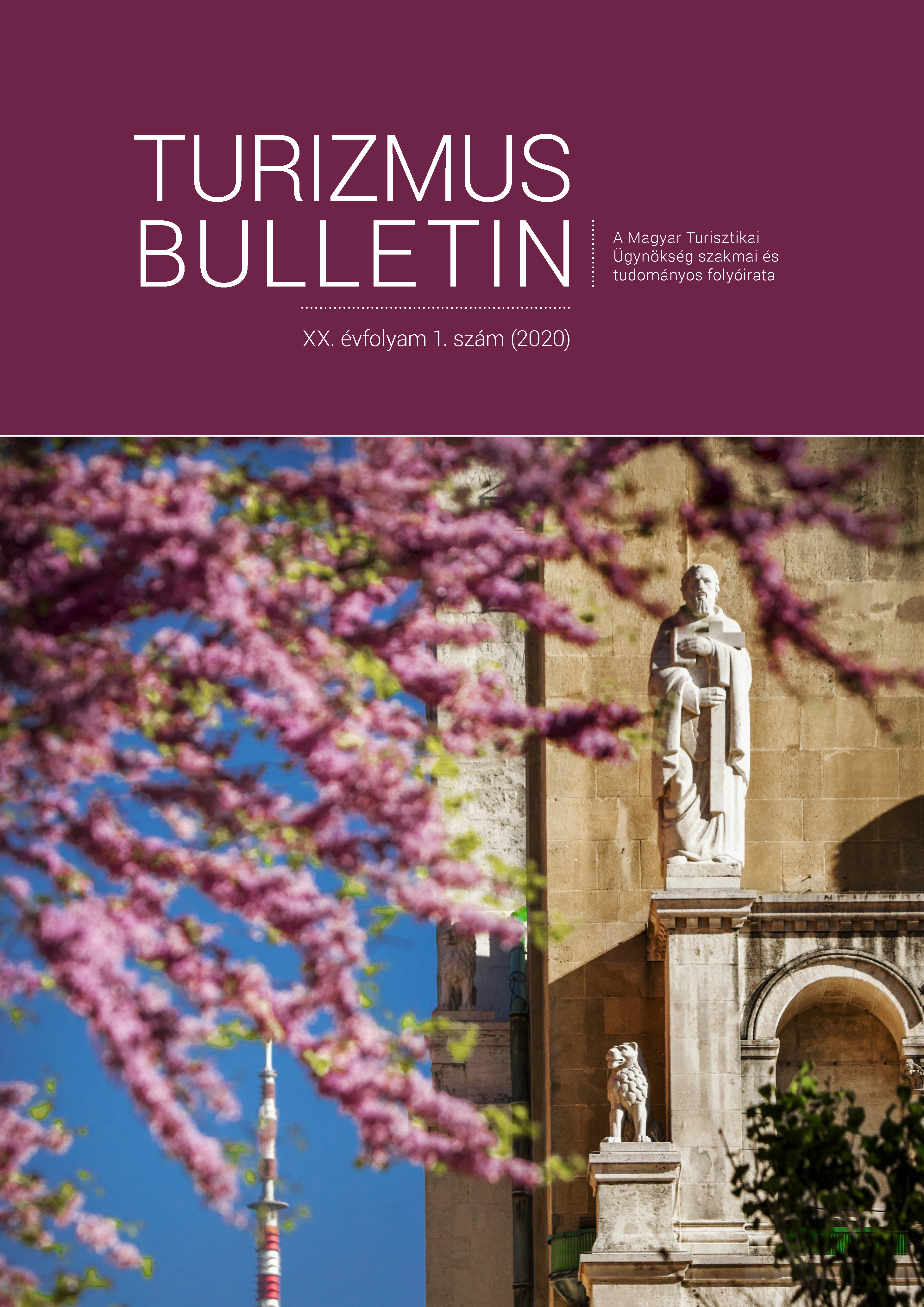University support for exchange students – in the context of educational tourism and internationalization
DOI:
https://doi.org/10.14267/TURBULL.2020v20n1.4Keywords:
educational tourism, foreign students, internationalization, Erasmus exchange programAbstract
The aim of our research is to investigate how Higher Education institutions can assist foreign exchange students before and during their exchange programs. The literature of internationalization in relation to Higher Education is reviewed and internationalization models of universities in different countries are presented. By means of content analysis and in-depth interviews, we suggest possibilities for supporting exchange students and offer examples of best practice. Websites of one Hungarian and nine foreign universities are analysed based on 26 criteria. In addition, we conducted in-depth interviews with an Erasmus Program Coordinator at a Hungarian Higher Education institution and a leader of a university student body (ESN) to explore the topic more comprehensively.
References
BENTAO, Y. (2011): Internationalization at Home. Chinese Education & Society. 44(5). pp. 84–96. https://doi.org/10.2753/CED1061-1932440507
BOHN, A. – DAVIS, D. – MEARES, D. – PEARCE, D. (2002): Global student mobility 2025: Forecasts of the global demand for international higher education. Sydney: IDP Education Australia.
CURRIE, J. (1998): Globalization as an analytical concept and local policy response. In: Currie, J. – Newson, J. (eds): Universities and globalization: Critical perspectives. Thousand Oaks, CA: Sage. pp. 15–20.
ELLINGBOE, B. J. (1998): Divisional strategies to internationalize a campus portrait: Results, resistance and recommendations from a case study at a U.S. university’. In: Mestenhauser, J. A. – Ellingboe, B. J (eds): Reforming the Higher Education Curriculum: Internationalizing the Campus. Phoenix, AZ: Oryx Press. pp. 198–228.
ERNSZT, I. – BIRKNER, Z. – KELLER, K. (2016) Cross-border Cooperation between Hungary and Croatia: Connecting People and Traditions. In: Svéhlik Cs. (szerk.): Útkeresés–Tudomány–Felelősség. Tanulmánykötet: válogatás a 2006 és 2015 között megrendezésre került KHEOPS nemzetközi tudományos konferenciák legszínvonalasabb előadásainak írott verzióiból. KHEOPS Automobil-Kutató Intézet, Mór. pp. 492–498.
GÁTI M. – KOLOS K. (2012): Az elektronikus kereskedelem alkalmazása a hazai vállalatok körében – a piacorientáció és a marketingkörnyezet szerepe. Vez eté st u d om ány. 43. pp. 91–97.
GUMPORT, P. J. – SPORN, B. (1999): Institutional adaptation: Demands for management reform and university administration. In: Smart, J. – Tierney, W. G. (eds): Higher Education: Handbook of Theory and Research. 14. Springer, Dordrecht. pp. 103–145. https://doi.org/10.1007/978-94-01 1 - 3 9 5 5 -7_ 3
GYULAVÁRI T. (2011): A vállalatok árképzési gyakorlata a versenyképesség szolgálatában. Vez eté st u d om ány. 42. (decemberi különszám) pp. 46 –52.
HARARI, M. (1994): Internationalization of Higher Education. In: Postlethwaite, T. N. – Husen, T. (eds): The International Encyclopedia of Education.New York: Pergamon. pp. 229–231.
HARMAN, G. (2004): New directions in internationalizing higher education: Australia’s development as an exporter of higher education services. Higher Education Policy. 17. pp. 101–120. DOI: 10.1057/palgrave.hep.8300044
JIANG, X. (2008): Towards the internationalisation of higher education from a critical perspective. Journal of Further and Higher Education. 32(4). pp. 347–358. https://doi.org/10.1080/03098770802395561
KASZÁS N. – PÉTER E. – NÉMETH K. (2015a): A tudásátadás különböző formáinak megjelenése a határon átnyúló pályázati projektek esetében. In: Ferencz Á. (szerk.): II. Gazdálkodás és Menedzsment Tudományos Konferencia: "A vidék él és élni akar". Kecskeméti Főiskola Kertészeti Főiskolai Kar. pp. 135–140.
KASZÁS N. – KELLER K. – BIRKNER Z. (2015b): A felsőoktatási intézmények előtt álló kihívások a magyar-horvát határ mentén. In: Ferencz Á. (szerk.): II. Gazdálkodás és Menedzsment Tudományos Konferencia: "A vidék él és élni akar".Kecskeméti Főiskola Kertészeti Főiskolai Kar. pp. 368–373.
KNIGHT, J. (1999): Internationalization of higher education. In: Knight, J. (ed): Quality of internationalization in higher education. Paris, OECD. pp. 13–18.
KRISTENSEN, K. H. – KARLSEN, J. E. (2018): Strategies for internationalisation at technical universities in the Nordic countries. Tertiary Education and Management. 24(1). pp. 19–33. https://doi.org/10.1080/13583883.2017.1323949
MAJOROS P. (2004): A kutatásmódszertan alapjai.Perfekt, Budapest.
MARGINSON, S. (2007): ”One little piece of endless sky ...” Global flows and global field: Imagining worldwide relations of power in higher education. Paper presented at the ESRC-funded seminar series: ‘Geographies of knowledge/Geometries of power: Global higher education in the 21st century’, February 5-7. Greg y nog , Wa les.
NÉMETH K. (2017): Vidéki térségek innovációs kihívásai – Megújuló energia alternatívák. Pannon Egyetemi Kiadó, Veszprém.
PÉTER E. (2018): Hatékonyan élni a digitális világban: Az intellektuális tőke, mint vállalkozást dinamikusan összetartó erő. In: Gaál Z. (szerk.): Élni és dolgozni a digitális világban. Kőszeg: Felsőfokú Tanulmányok Intézete. pp. 87–109.
POPE, C. – ZIEBLAND, S. – MAYS, N. (2000): Qualitative research in health care. Analysing qualitative data. BMJ Clinical Research. 320(7227). pp. 114–116. DOI: 10.1136/bmj.320.7227.114
POWERS, B. – KNAPP, T. (2006): Dictionary of Nursing Theory and Research. New York: Springer Publishing Company.
SMITH, S. (1991): Report of the Commission of Inquiry on Canadian University Education. Ottawa: Association of Universities and Colleges of Canada.
SPORN, B. (1999): Current issues and future priorities for European higher education systems. In: Altbach, P. G. – Peterson, P. M. (eds): Higher Education in the 21st Century: Global Challenge and National Response. New York: Institute of International Education. pp. 6 7– 7 7.
WANG, Y. J. – GAO, Y. M. (2000): Higher Education Internationalization: An Important Topic of Chinese Higher Education Development In The Twenty-First Century. Research on Education Tsinghua University. 2. pp. 13 –16.
WARWICK, P. – MOOGAN, Y. J. (2013): A comparative study of perceptions of internationalisation strategies in UK universities. Compare: A Journal of Comparative and International Education. 43(1). pp. 102–123. https://doi.org/10.1080/03057925.2013.746573
Internetes források
BUDAPESTI CORVINUS EGYETEM (2018): A Budapesti Corvinus Egyetem Nemzetköziesedési Stratégiája. http://www.uni-corvinus.hu/fileadmin/user_upload/hu/kozponti_szervezeti_egysegek/rektori_hivatal/files/szabalyzatok/BCE_Nemzetkozesedesi_Strategia_2018_majus_8.pdf, Letöltve: 2019. március 10.
EGRON-POLAK, E. – HUDSON, R. (2014): Internationalization of Higher Education: Growing expectations, fundamental values.IAU 4th global survey. Executive summary. https://iau-aiu.net/IMG/pdf/iau-4th-global-survey-executive-summary-2.pdf, Letöltve: 2019. március 1.
MITCHELL, D. E. – NIELSEN, S. Y. (2012): Internationalization and Globalization in Higher Education. In: Cuadra-Montiel, H. (ed): Globalization – Education and Management Agendas. IntechOpen. pp. 3–18. DOI: 10.5772/48702. https://www.intechopen.com/books/globalization-education-and-management-agendas/internationalization-and-globalization-in-higher-education, Letöltve: 2019. március 10.
TEMPUS KÖZALAPÍTVÁNY (2019): ERASMUS+ program. https://tka.hu/palyazatok/108/-erasmus, Letöltve: 2019. március 10.

